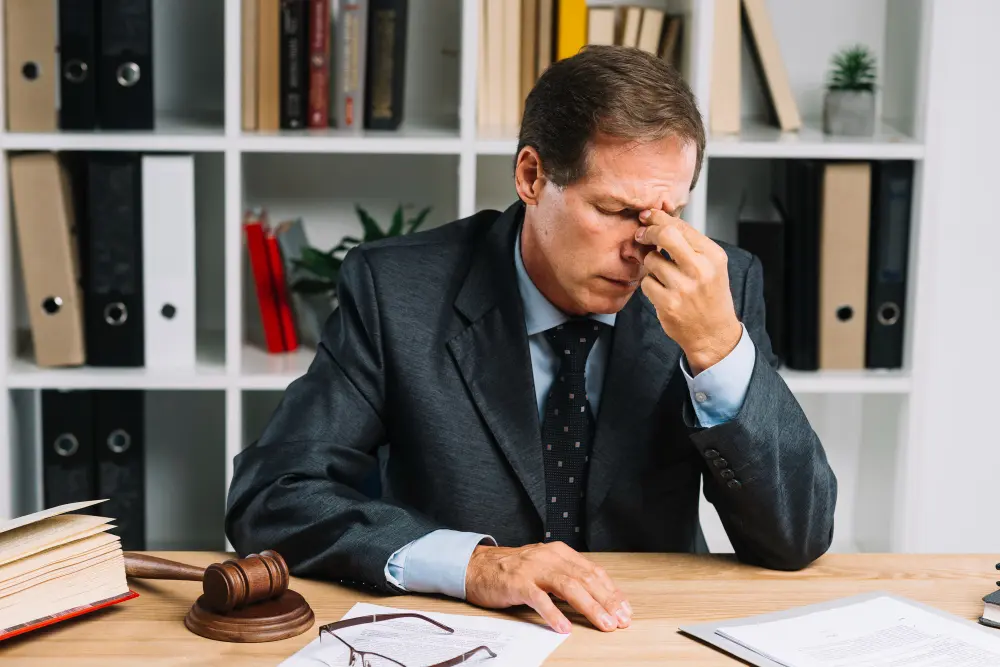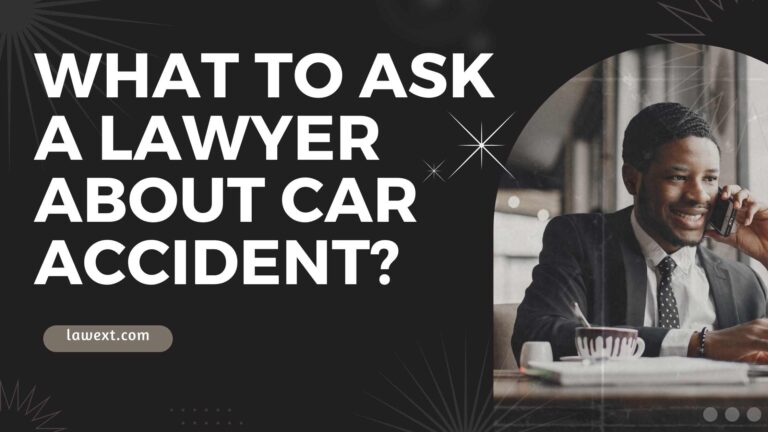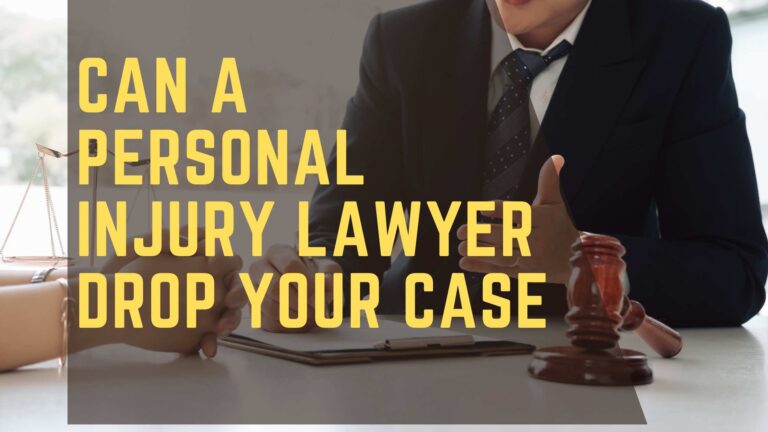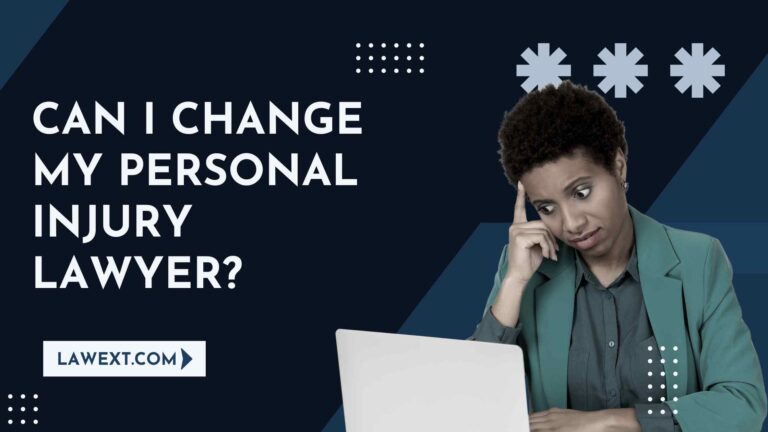Can You Fire a Personal Injury Lawyer?

Yes, you can fire a personal injury lawyer if you are not satisfied with their services. Personal injury lawyers play a crucial role in helping individuals seek compensation for their injuries.
Table of Contents
However, there are instances when clients may become dissatisfied with their lawyer’s handling of their case. In such situations, it is important to know that you have the right to fire your personal injury lawyer. This article will discuss about Can You Fire a Personal Injury Lawyer?
Additionally, it will highlight the importance of open communication and trust in the lawyer-client relationship to avoid disputes that may require firing the attorney. By understanding the process and knowing your rights, you can make an informed decision regarding your legal representation.

Credit: vanguardinjuryattorneys.com
Reasons For Firing A Personal Injury Lawyer
Personal injury lawyers can be fired for various reasons, including lack of communication, unethical behavior, incompetence, or conflicts of interest. Clients have the right to choose legal representation that best serves their needs.
Lack of Communication
Lack of Communication is a common reason why individuals may consider firing their personal injury lawyer. As a client, you have the right to expect regular updates and clear communication regarding your case. When your lawyer fails to promptly respond to your calls or emails, it can leave you feeling frustrated and in the dark. Communication is essential in a legal matter, as it keeps you informed about the progress of your case and any important developments. If your lawyer consistently fails to communicate effectively, it may be time to consider finding a new attorney who values open and timely communication.
Incompetence
Incompetence is another significant reason for terminating the services of a personal injury lawyer. A competent attorney should possess the necessary skills, knowledge, and experience to effectively handle your case. If your lawyer consistently demonstrates a lack of understanding of the law, makes critical mistakes, or fails to provide you with sound legal advice, it can significantly jeopardize the outcome of your personal injury claim. Remember, your lawyer’s competence directly impacts your chances of receiving rightful compensation. In such cases, it is crucial to seek a more capable legal representative who can skillfully navigate the complexities of your personal injury case.
Conflict of Interest
Conflict of Interest is a serious concern that may warrant firing your personal injury lawyer. Your lawyer needs to prioritize your best interests above all else. However, if you discover that your lawyer has a personal or financial interest that could potentially compromise your case, it is a red flag. For instance, if your lawyer represents the opposing party, has a close relationship with the insurance company, or stands to gain from a specific outcome, it raises questions about their ability to advocate exclusively for your rights. To protect your interests fully, it is necessary to seek new legal representation free from any potential conflicts of interest.
Remember, hiring a personal injury lawyer is an important decision, and you deserve to have a legal representative who is competent, communicative, and dedicated to achieving the best possible outcome for your case.
Steps To Fire A Personal Injury Lawyer
Firing a personal injury lawyer is a decision that should be approached thoughtfully and methodically. If you find yourself in a situation where you are considering parting ways with your current legal representation, it’s important to know the appropriate steps to take. By following the necessary procedures, you can ensure a smooth transition to a new attorney who can adequately represent your interests. Below are the essential steps to take when contemplating firing a personal injury lawyer.
Review The Contract
Review the contract you signed with your current personal injury lawyer to understand the terms and conditions of the agreement, including any provisions related to termination and engagement. Look for details on the process for ending the attorney-client relationship and any potential financial implications.
Discuss Concerns With The Lawyer
If you have concerns about your lawyer’s performance or communication, it’s essential to first address these issues directly with your attorney. Schedule a meeting to discuss your concerns and potential areas of improvement. Clear communication may resolve any misunderstandings or issues.
Consult Another Attorney
Before making any final decisions, it’s advisable to consult with another personal injury lawyer to get a second opinion on your case and the potential dismissal of your current attorney. This step can provide you with valuable insight into your legal options and potential consequences.
Formally Terminate The Relationship
If, after careful consideration and discussion, you decide to proceed with firing your personal injury lawyer, you must formally terminate the relationship. Send a written notification to your attorney, clearly stating the termination of their services and requesting any relevant case materials to be provided to your new attorney. Following these formalities is crucial to ensuring a smooth transition and legal process.
Considerations Before Firing A Personal Injury Lawyer
When your personal injury case is not going according to your expectations, you may start contemplating firing your current lawyer. However, before making such a significant decision, it is crucial to consider a few important factors that can impact the outcome of your case. Evaluating the potential impact on case progress, financial implications, and finding a replacement lawyer are key considerations to keep in mind before firing your personal injury lawyer.
Impact On Case Progress
Changing your lawyer might have an impact on the progress of your personal injury case. As your current attorney is familiar with your case’s details, removing them from the equation can cause a delay in proceedings. It is important to assess whether firing your lawyer will lead to the loss of important case information or affect your current legal strategy. Communicating your concerns and expectations with your lawyer before taking any further steps can help address issues and potentially avoid the need for a complete lawyer switch.
Financial Implications
Before making the decision to fire your personal injury lawyer, it is crucial to understand the potential financial implications. Consider any signed fee agreements, retainer fees, or outstanding bills with your current lawyer. Terminating your current legal representation could result in additional costs or expenses, depending on the terms of your agreement. Assess your financial situation and the potential costs associated with hiring a new lawyer before proceeding.
Finding A Replacement Lawyer
If you have decided to fire your current personal injury lawyer, finding a suitable replacement is critical to the success of your case. Take the time to research and meet with potential candidates, ensuring they have experience in handling personal injury cases similar to yours. Check their track record, reviews, and certifications to determine their credibility and expertise. Finding a replacement lawyer who can pick up where your previous attorney left off and maintain the trajectory of your case smoothly is essential for a positive outcome.
Legal And Ethical Obligations
The relationship between a personal injury lawyer and their client is built on trust, with specific legal and ethical obligations that must be upheld. It is important to understand these obligations, as they play a crucial role in ensuring justice and fair representation. In this section, we will discuss three key aspects of the legal and ethical obligations of a personal injury lawyer: paying outstanding fees, protecting client confidentiality, and returning case materials.
Paying Outstanding Fees
When terminating the services of a personal injury lawyer, it is essential to address any outstanding fees. Both parties should come to a mutual agreement regarding the fee arrangement and any remaining balance. Here are a few key points to consider:
- Prioritize open communication to discuss outstanding fees and resolve any concerns or discrepancies promptly.
- Ensure transparency by requesting an itemized invoice that outlines the services provided and associated costs.
- Establish a reasonable timeframe for the settlement of outstanding fees, taking into account any financial constraints on both sides.
Protecting Client Confidentiality
Confidentiality is a fundamental aspect of the attorney-client relationship. Personal injury lawyers are bound by strict ethical guidelines that ensure the privacy and protection of their clients’ information. Here are some key considerations for ensuring client confidentiality:
- Maintain strict confidentiality standards by not disclosing any information about the client or their case without their explicit consent.
- Use secure methods of communication, such as encrypted emails or password-protected documents, to safeguard sensitive information.
- Destroy or return any confidential documents or evidence once the attorney-client relationship has ended.
Returning Case Materials
When a personal injury lawyer is fired or replaced, they have a duty to return any case materials to their client. These materials may include documents, evidence, or any other items relevant to the case. Here’s what to expect:
- Ensure that all case materials are promptly returned to the client to avoid any delays in legal proceedings.
- Organize and provide a comprehensive list of the materials being returned to the client for reference and clarity.
- Clarify any potential limitations or restrictions on the use of these materials, if applicable, to avoid any conflicts or breaches of legal responsibilities.
Tips For Avoiding The Need To Fire A Personal Injury Lawyer
Preventing the need to fire a personal injury lawyer can save time, money, and stress. Here are some essential tips that can help you avoid the need to fire a personal injury lawyer.
Thoroughly Research Potential Lawyers
Before hiring a personal injury lawyer, conduct thorough research. Look for their experience, track record, and customer reviews to gain insight into their capabilities.
Ask For References
Request references from the lawyer to gain a better understanding of their past clients’ experiences. Talking to previous clients can provide valuable insights into the lawyer’s professionalism and the success rate of their cases.
Have A Clear Fee Agreement
Ensure that you have a written, transparent fee agreement with the lawyer. This should include details about the billing structure, any additional expenses, and the circumstances under which the agreement can be altered.
Establish Communication Expectations
Communicate your expectations regarding communication with your lawyer. Ensure that you both agree on how often you will be updated about your case and the preferred method of communication, whether it’s email, phone calls, or in-person meetings.

Credit: injuryattorneyflorida.com
Conclusion
So, if you feel frustrated with your personal injury lawyer, bear in mind that you do have the option to fire them. It’s essential to consider the potential consequences and weigh the pros and cons before making such a decision.
Remember, communication is key in addressing any concerns. Always consult legal advice before taking any action.
Introducing Jonah Plum, a legal luminary whose journey through the corridors of justice has been intertwined with the eloquence of the written word. Born and raised in the vibrant city of Seattle, Washington, Jonah's early fascination with language and debate laid the foundation for a remarkable career in law.
Jonah's scholarly odyssey began at Harvard Law School, where they immersed themselves in the study of jurisprudence, honing their analytical prowess and legal acumen. Armed with a law degree, they entered the legal arena, navigating courtrooms and boardrooms with a fervor for justice. Yet, it was the realization of the transformative power of the written word that led Jonah to pivot from legal briefs to the world of blogging.
A digital advocate in the truest sense, Jonah recognized the need for demystifying legal concepts and making them accessible to a broader audience. This blog, a virtual repository of legal insights, transcends geographical boundaries, connecting with a global readership hungry for clarity amidst legal complexities.
Beyond the black letter of the law, Jonah delves into the human stories that underscore the legal landscape. Their writing goes beyond legal analysis, weaving narratives that humanize the law, shedding light on its impact on individuals and society.






